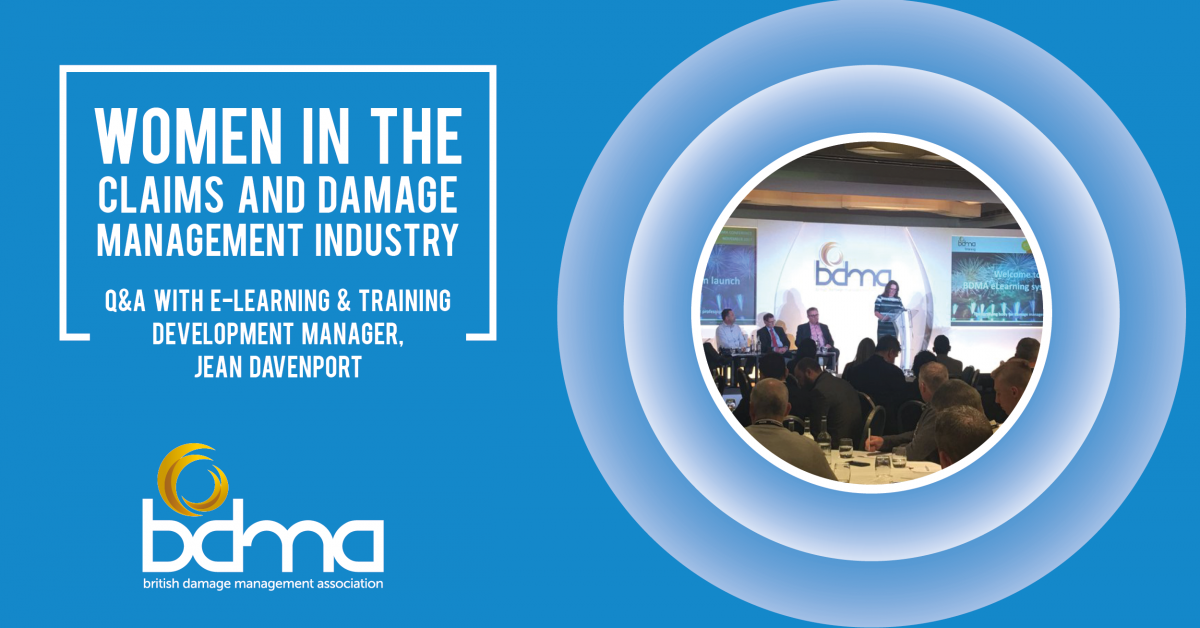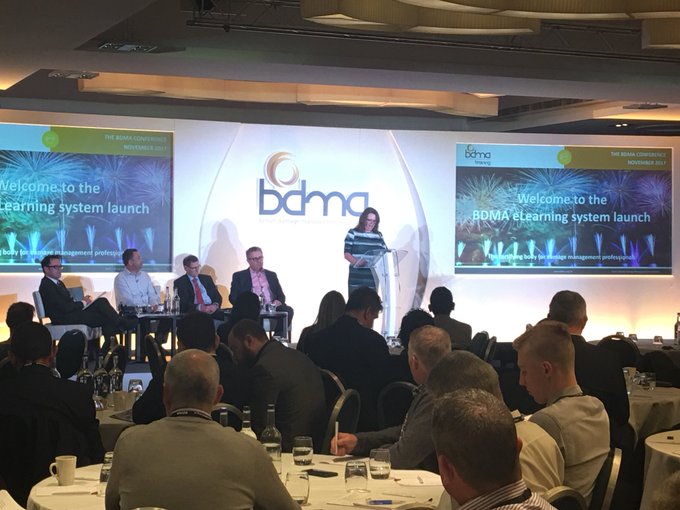Women in the claims and damage management industry – Q&A with e-Learning & Training Development Manager, Jean Davenport

Despite positive advances in recent years, it has been well-documented that women still remain under-represented in the claims and damage management industry. In light of this, we recently caught up with our BDMA e-Learning & Training Development Manager, Jean Davenport, to discuss her experience of working within an industry that is traditionally dominated by men.
Can you tell us a bit about your background and how you entered the industry?
I originally started my career working in the IT department initially for Guardian Royal Exchange and latterly for AXA Insurance after their acquisition of Guardian. After a number of varied roles, I managed the IT budget and portfolio for both property and casualty departments, including external supplier relationships. Ultimately, I was able to transfer these skills to work more closely with the business as Claims Supply Chain Manager responsible for the sourcing, compliance and performance management of AXA’s preferred supply chain operators. After leaving AXA, I moved into my current role at the BDMA as e-Learning & Training Project Manager. My present role involves oversight of the BDMA training strategy and the management and development of our e-Academy system, providing BDMA members with enhanced learning options.
Were there many opportunities when getting into the claims industry?
I believe if we were able to talk to the majority of people within the claims and damage management industry, I would guarantee that most of them would use the phrase ‘I fell into this industry’. Like most people, I was quite unaware of this niche industry before working in it.
Do you feel that the industry is opening up more to women?
To some extent, yes. During my 25+ years in the industry, I’ve been encouraged by the number of women I’ve seen entering the industry and progressing to sought after roles. Within the BDMA Exec Board, we are delighted to now have Kathryn Rodgers from Harwell Restoration as a Director. We have also recently welcomed as an Exec Board Member, Marie Stearn, Operations Director at DisasterCare Platinum.
Outside of the BDMA, I’ve also seen a shift in attitudes. It was encouraging to see Sian Fisher transition to CEO at the CII (Chartered Insurance Institute) in 2016. Sian is a strong advocate for equality and is the founding member of the Insuring Women’s Futures initiative.
I was also pleased to see the recent announcement of Amanda Blanc’s appointment as Chief Executive at Aviva UK. Amanda’s appointment means there are now six women heading the 100 largest UK companies, which shows progress within the industry – but 6% also shows that there is a long way to go!
How can the industry be more inclusive for women?
In her autobiography, Karen Brady says that senior women need to hold the door open “as wide as possible, for as long as possible, to allow other women to march through it.” Organisations need to consider formal mentoring programmes with career paths focussing on both recruitment and retention.
The adoption of more flexible working patterns enabling an improved work life balance is also a positive benefit, perhaps ironically highlighted by the massive increase in homeworking due to the COVID-19 pandemic.
We have made great gains within the industry for equality, but we still have more work to do. I think it’s crucial for us to raise awareness of claims and damage management as a career option for women. It is also important to highlight role models who are successful. Social media is a fantastic opportunity for us to showcase our industry and is also a great place for posting vacancies, as they are likely to be seen by a more diverse audience.
Are there any challenges you have faced, and if so, how have you overcome them?
I think many women within the industry have experienced challenges. I have personally seen age related discrimination in large organisations where ‘youthful enthusiasm’ is preferred to experience. Plus, there is the assumption that capability is diminished by age. It is important to me that, as an industry, we question bias as it influences our perception and behaviour. It is vitally important for everyone to take personal responsibility to recognise and overcome bias, however it manifests itself. It is only when we are open to questioning our own motivations, whether they are gender or age related, that we will make positive changes.
What piece of advice would you give to women out there, who are interested in getting into the claims industry?
Find a mentor from role models that you identify who can lead you to the career path you want. Your organisation may already have a mentoring scheme in place, but a mentor may not be someone from your own organisation. Use social media to identify groups you can join where you can get support and share information. Don’t be afraid to try something new and take on new challenges.
Our Equality and Diversity course has just been added to our online e-Academy. This course is free to BDMA members and is £20 + VAT for non-members. Organisations are legally required to adhere to certain practices to ensure discrimination is eliminated and expectations of equality are consistently met within the workplace. By undertaking this Equality and Diversity e-Learning course you and your employees will gain a better understanding about the meaning and importance of equality and diversity. Users will gain an understanding of the different types of discrimination and identify harassment, victimisation and bullying behaviour in the workplace.
This course will enable your employees to develop a fairer, more inclusive working environment. Would you like to find out more? Enrol here.
Photo from the BDMA Conference 2017. Jean addressing predominantly male audience.

